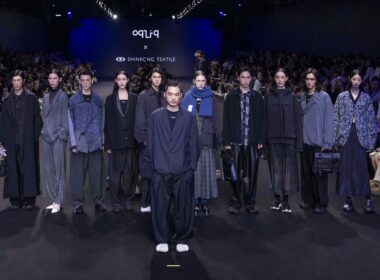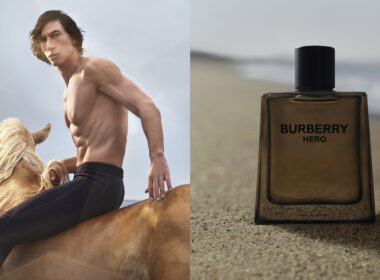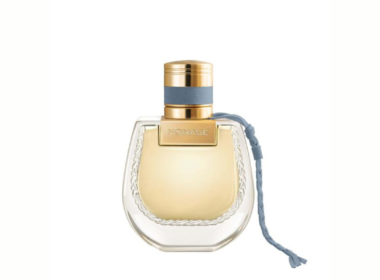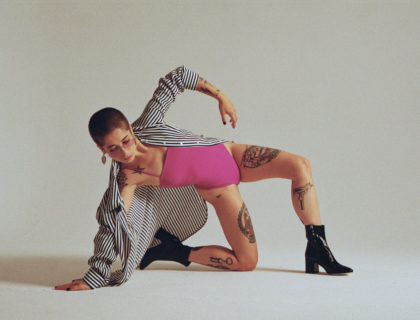It was eleven years ago, that Martina Müller founded her design house “Callisti”. Eleven years, in which she became one of Austria’s most celebrated Ready-to-Wear and Couture designers with international recognition, such as the “Designer of the Year” Award by German Elle. Shortly before her AW18/19 show at MQ Vienna Fashion Week, she invited us to her beautiful boutique to talk to us about her journey, her view on the Austrian fashion business and what it means to be a high-end designer in today’s harsh fashion industry.

What did you do before you started your own design house?
Actually, I started with Fashion Design when I was a child, I was always drawing and I always had a passion for feminine tailoring and clothes, also for the female body. I always tried to sketch it and when I was 13 I tried to produce my first own dress or shirt and from that moment I practised every time, I was sewing and stitching day and night, everything I do is self-taught.
When I was around 20 I had my first collection in a design store in the first district and right after that I left Austria for America, lived for 3 years in Miami and New York, where I got inspired a lot. I worked in styling a lot during that time and eventually returned to Austria. Here, I started my first company, which was revolving around styling, fashion show production, etc. At the end of the day, I have always worked in the industry and finally 11 years ago I founded my label Callisti.

What does Callisti stand for?
Callisti is Greek and means “to the beautiful one” or “to the most beautiful one”.

What does Callisti stand for you?
Honestly speaking, the same. 11 years ago, when I was looking for the right name for my label I happened to be in Greece and discovered this word in a tourist guide and found it perfectly fitting. I have always worked on designs and my style was always very form fitting, a little sexy etc. From what I observe, I can see that women who try or wear Callisti do feel more confident and beautiful as soon as they put on the garment. Through cuts, I always try to highlight the feminine silhouette and beauty of the female body.
Callisti for me is the perfect name, it means that when you wear a Callisti piece, you instantly start to feel more beautiful, which, if we are honest, is something important for everyone, especially women.

When did you start creating menswear?
That must have been 5 or 6 years ago. I think I presented my first menswear collection in 2012.

How did you experience the reactions to it?
Difficult. I do have some loyal clients of course, they love it and always come back, but especially in Austria, menswear tends to be more in the conservative-sporty style. In Austria, men are not daring, in the best case you see jeans and a polo shirt, which, for designers, is terribly boring. With more daring pieces the reactions are often ‘looks cool, but I cannot wear it, I cannot do it in my business.’.
That is why Chris is fantastic for me, as he is a man that loves fashion and lives it, he wears more extravagant pieces and feels it.

The reactions towards your womenswear collections are more open, or? There are a lot of women that do wear your pieces?
Yes, I mean I do believe I have a smaller target audience; why? Because a lot of women that like my pieces say ‘well, yes but one needs to be a size 6 or 8’. That, of course, is not true. I have a few women, that do wear my designs, and maybe they are size 12, 14 or whatever and it looks great. Generally speaking, though, my designs attract slimmer women, that keep an eye on their size and that do enjoy wearing something sexy. At the end of the day, I do not have a highly commercial product, I fulfil more the interest of a niche.
How did you see the Austrian Fashion Industry change within the last 11 years?
I have the feeling that within the last 11 years a lot has changed. Back then, there were maybe 2 or 3 well-known designers. Nowadays, every year I do not know how many new designers pop up and, honestly speaking, even more, that want to be so. Because it’s cool and the fashion industry is so hip and then one starts a “label” or whatever just to be “adabei” (an Austrian expression for the group of people surrounding the high-society or certain society wishing to be a part of it). This person then is shortly there and disappears even faster again. This attitude, honestly speaking, bores me a lot. When I do something, I give it 100% and not only because ‘it so cool and amazing’ to part of it. It’s a side effect but most people don’t understand just how much work is behind it. I really am happy when I see when people stay longer in the industry than 2, 3 years and really work themselves up instead of giving up because reality is just a bit harder than they expect it to be.
I think part of why things have changed in this direction is because of Facebook and Instagram. Nowadays, everyone can do everything a little bit, everybody is a bit of a photographer, a bit of a model. Then you have these online companies that offer a little bit of designing where you can say ‘I want a short or a long sleeve and this and that colour’, and the person that made these two decisions all of the sudden is a designer. That, to me, is not enough. There are far too many people of this kind around, in my opinion. Most people actually do not know what it means to be a designer, to start a design from the scratch, the cut, the prototype etc., if someone does that, then this is fashion design.
Do you believe that people actually know the worth of actual Fashion Design and craftsmanship in Austria?
Luckily there are always people, that have a feeling for that and understand design. Those people want to level themselves up and be individualistic. They refuse to go to some Fast Fashion retailer and wear the same things any other person does. Thank God, there are people that appreciate design, but surely not everyone. Maybe for some people, the connection and understanding to it is missing.
To give you an example, I have people coming in, having a look at my pieces, saying ‘The price is really reasonable’ and then again there are those that say ‘Oh that is very high priced’. When one explains that this is design and craftsmanship produced in Austria and the understanding is still not there, all I can say is please do go to H&M and Zara, nobody is being forced to buy into design. Although I have to say, it does hurt a bit when you put your blood, sweat and tears into a design and someone comes in saying “well this is expensive.”
After all these years, why did you choose to return to Austria?
Back then it was for personal reasons. In my heart, I always wanted to go to America; Austria is my Homebase, I grew up here, but funny enough, I always intended to go to America. Then, eleven years ago when I started my label with my own store it was logical that I had to stay here and then everything build itself up step by step, so there was no way of considering to leave Austria for the next couple of years.
You were invited to show at Berlin Fashion Week, what are the next steps for you in Europe or globally?
In general, it was always dear to me to work internationally, but honestly speaking, that is a financial question. To show in Berlin was based on the invitation from Mercedes Benz and German Elle, as I was awarded as the “Designer of the year”. Showing in Berlin was a big story, every day was fully planned through, I always had people on my side assisting me whereas in Vienna I have to do every step more or less by myself.
To show at Vienna Fashion Week is financially possible for a designer, but to show internationally we are talking big sums of money and then it obviously gets more difficult, you also have to make the money again through sales.

How do you think Austrian Fashion and Austrian Design are being perceived in the last years?
There are quite a few Austrian designers, like Lena Hoschek and Marina Hoermannseder that are internationally recognized, but I believe to be internationally successful, you have to leave Austria.
If you stay, it is far more difficult as a lot of things are missing like open-minded clients, that dare to wear something out of the box and are open to spend money on it. Honestly, we are also lacking in the big magazines like Vogue, Cosmopolitan and Harper’s Bazaar. Austria also does not have truly fashion conscious blogger, and most importantly, of course, buyers from big multi-brand and concept stores, these are all things that build up a brand. The first thing that comes is what you do as a designer and your work, but completely alone, that is also not possible.
What kind of women are your clients?
At the end of the day, it is very mixed. I would say, the self-confident businesswoman, surprisingly we do have a lot of lawyers, doctors; I think we have a lot of women that work in a strict, serious business and that would like to show another side of them out of the office.
When it comes to age, we do have some 20-year-olds but mainly I would say my clients are between 25 and 55.
Since you are in the boutique yourself you are in direct contact to your clients, and the people see and know you as Callisti. How is it for you, to privately be Martina but then again also to be Callisti?
Well, I am not in the boutique all the time, I spend a lot of time in the atelier, creating the next collection.
Maybe I have a different take on things that are normal to a lot of people. Personally, I do not like my name Martina and funny enough, when people say, this is Callisti I can identify myself more with that. That is what I build up by myself, it is not something my mother has decided, now this is your name and you have to deal with it for the rest of your life.

What are your plans for the future?
I do want to get out, to do something internationally. Let’s see, what is possible there. As I said, firstly it is a financial question. To get as big and international as I would like, I think it would be much easier and possible with an investor.












